



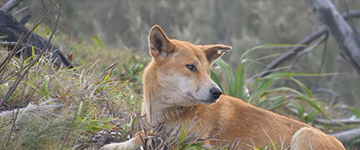

Date: 25th February 2024
keywords: Aboriginal names
ABC News article: Latest K'gari (Fraser Island) dingo attacks spark breeding season warning (link)
This article concerning dingo attacks on Fraser Island did not mention Fraser Island. I wrote down what I heard and I transcribed it as 'Dahlee'.
I was brought up knowing the term 'Fraser Island', but it is now referred to by it's Aboriginal name. I did a Google question and found the Aboriginal name is transcribed as K'gari.
The thing with languages is that each has a phonetic vocabulary (phones & phonemes), and Aboriginal languages have different sound vocabularies to English.
Only native Aboriginal speakers are able to pronounce these names accurately, and since there is no written form for any Aboriginal language, the result of replacing European names for places by Aboriginal ones is utter confusion, mis-pronunciation and a lack of communication.
The adoption of Aboriginal names is a direct attack on the notion that Australia has an official language, namely English. And also ignores the fact that there are probably no Aboriginal people living in a particular place that speak the original Aboriginal language of that area.
This is pure, woke, virtue signalling and basically stupid. Most Australians, including those of Aboriginal heritage, have English as a first language and they do not have the phonetic vocabulary to pronounce these names accurately.
Since 'the voice' referendum, there has been a concerted effort by Governments and media channels to deny the validity of an absolutely democratic process: a referendum. They say that 60% of people voted 'no' because they were misinformed. After all the publicity and active brainwashing that went on.
This is fascism plain and simple.
* * * * *
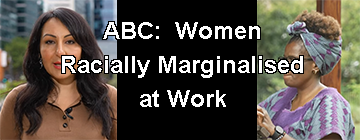

Date: 10th February 2023
keywords: group dynamics, victim mentality
Why racially marginalised women hide their identity by 'code-switching' to act 'white' at work
This article appeared on ABC News 6th March 2023.
The heading of the directory on the ABC site is 'iwd-', which indicates that we can expect to see a series of articles referencing disadvantaged women in the lead up and aftermath of 'International Women's Day'.
It is interesting to read the article carefully. The women are not complaining about being racially abused or picked on (now). They are complaining about their own attitudes to their work situations.
If you read about 'Group Dynamics', (Wikipedia article), it is clear that what the women are doing is the same as any other person would do/has to do within the confines of a social group. The difference is that because these women are members of minority racial/cultural groups, the accommodation they must make to group dynamics is classed as discrimination. Other members of the work/social group (say white men) are merely being exposed to group dynamics.
It seems to me that a fundamental principle of 'wokeism' is to take a natural feature of social life and demonise it where it applies to select, usually minority, groups. This keeps a lot of people in highly paid jobs in the 'WOKE' and 'POLITICALLY CORRECT' industries.
The organisation who 'produced' this report, the Diversity Council Australia (DCA), is a 'not-for-profit' and a 'registered charity'. I would wager though, that the people operating the organisation do not do so on a voluntary basis. I'm sure there is a dedicated team of high-fliers drawing executive salaries. And the continued existence of their organisation is dependent on the persistence of discrimination and exclusion. Little wonder they find it everywhere.
'Code-switching ... is common in Australian workplaces,' they say. I agree with them. In fact we all do it. It is called 'group participation': we put our differences to one side and work together.
There is a massive industry built around discrimination, and they find it everywhere. As Konstantin Kossin says: 'It's like when you buy a new car. You see that car everywhere else as you drive around.' (YouTube) They are never about to admit the war has been won. Then they'd be out of a job.
* * * * *
Date: 10th February 2023
keywords: Australian constitution, powers of the federal government, sovereignty
TERRA NULLIUS? — BLACK SOVEREIGNTY
A major news item this week was the resignation of Senator Lidia Thorpe from The Greens Party.
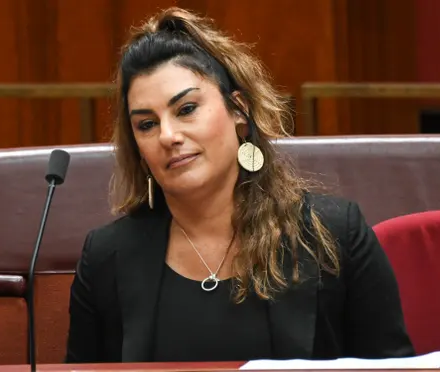

The senator stands opposed to The Green's policy of backing the 'Aboriginal Voice to Parliament' constitutional referendum. Instead she intends to spearhead the 'Black Sovereignty' movement, and campaign for a treaty with First Nations people, who she says, have never ceded their sovereignty over their lands.
There is a lot of misinformation being spread in the First Nations rights debate. Typical is a statement made by indigenous leader Tom Calma that the Mabo decision proved that Australia was not 'Terra Nullius'1* at the time of white settlement, suggesting that the occupation was illegal and First Nations peoples still owned the land.
The Mabo judgement, whilst recognising that the criteria for justifying the term 'terra nullius' had changed since the 17th century, accepted that the use of the term in the legal documents establishing the first white settlement in Australia, in 1788, was correct usage for its day. See articles.
The notion that 'terra nullius' was a mistake seems to be the basis for Lidia Thorpe's 'Black Sovereignty' push.
There is a clear statement of this issue in the Mabo judgement of Justice Brennan:
33. International law recognized conquest, cession, and occupation of territory that was terra nullius as three of the effective ways of acquiring sovereignty. ... The great voyages of European discovery opened to European nations the prospect of occupying new and valuable territories that were already inhabited. As among themselves, the European nations parcelled out the territories newly discovered to the sovereigns of the respective discoverers ... provided the discovery was confirmed by occupation and provided the indigenous inhabitants were not organized in a society that was united permanently for political action ... To these territories the European colonial nations applied the doctrines relating to acquisition of territory that was terra nullius. They recognized the sovereignty of the respective European nations over the territory of "backward peoples" and, by State practice, permitted the acquisition of sovereignty of such territory by occupation rather than by conquest ... Various justifications for the acquisition of sovereignty over the territory of "backward peoples" were advanced. The benefits of Christianity and European civilization had been seen as a sufficient justification from mediaeval times ... Another justification for the application of the theory of terra nullius to inhabited territory — a justification first advanced by Vattel at the end of the 18th century — was that new territories could be claimed by occupation if the land were uncultivated, for Europeans had a right to bring lands into production if they were left uncultivated by the indigenous inhabitants. (Link)
The Mabo decision was about the Meriam people of the Murray Islands — not the First Nations people of Australia. Their islands had been annexed by Queensland, mainly to give them protection from marauders. They were gardeners and had a higly developed (cultural) system of land ownership. Their land was never considered to be 'terra nullius'.
The final order reads:
(2)... declare that the Meriam people are entitled as against the whole world to possession, occupation, use and enjoyment of the lands of the Murray Islands;
(3) declare that the title of the Meriam people is subject to the power of the Parliament of Queensland and the power of the Governor in Council of Queensland to extinguish that title by valid exercise of their respective powers, provided any exercise of those powers is not inconsistent with the laws of the Commonwealth. (Link)
Whilst the case was about a claim by the Meriam people, the judgement did include some findings relevant to native title in Australia. In the summary of the court findings given by Mason & McHugh (Link) they note: "the common law of this country recognizes a form of native title ... that native title, where it exists, is a form of permissive occupancy at the will of the Crown."
Three of the seven justices also found that "extinguishment of native title by the Crown by inconsistent grant ... is wrongful and gives rise to a claim for compensatory damages." However, four justices did not agree with this conclusion.
The substance of the Mabo judgement does not support the notion that through some legal mix up, the sovereignty of Australia was not seized by the colonising British (this notion is just 'chinese whispers'). Native title is recognised in common law but where it exists, it does so by the permission of the Crown.
Holding a referendum to enshrine a right for Aboriginal peoples to have a voice to parliament, has brought the contents of the constitution into prominence.
The title of Lidia Thorpe's movement, 'Black Sovereignty', seems to be saying that inhabitants of Australia, who are not Aboriginal, do not have sovereignty over their own country, and that the government has some power to cede sovereignty to Aboriginal peoples.
If anything, the Mabo decision affirmed the fact that all Australian people, via the monarch and the government, have sovereignty. The constitution doesn't mention the possibility of anyone, other than the British monarch, having sovereignty over the country. And whilst the constitution gives an extended list of the powers that a federal government can exercise. (Link) Nowhere does it say that they can give away sovereignty to anyone, let alone a minority group.
Any ceding of sovereignty, say a treaty with Aboriginal people, that recognised that they had a special sovereignty over the land, would have to be affirmed by an alteration to the constitution and accepted by the sovereign, King Charles III, who holds the ultimate beneficial ownership to the land.
The statement by Anthony Albanese that recognition of an Aboriginal voice to parliament in the constitution is a purely symbolic gesture, is grossly misleading. He admits that such a voice could be established without a constitutional alteration. And the wording he has proposed does not include the statement: 'This is a purely symbolic gesture.' And it would have an effect: it would bind all future governments to this course of action and single out one group of Australians as having a special privilege under Australian law.
Even with the words 'This is a purely symbolic gesture', were added, future generations may ask: 'What are these words symbolic of?'
Of course the question of 'who is a First Nations person and who isn't', seems to have been put in the 'too-hard basket'. See Bolt on Dark Emu.
Footnote: 1. The term 'terra nullius' consists of the Latin words 'terra', meaning 'earth' and 'nullius', the genative form of 'nullus' meaning 'no one'. Genative is the possessive case, so 'nullius' translates as 'no one's'.
It is a common error to take 'nullius' to mean 'empty' or 'uninhabited'. However, it actually means 'land that is not owned by anybody'.
* * * * *
Date: 7th February 2023
keywords: integrity of language, political correctness.
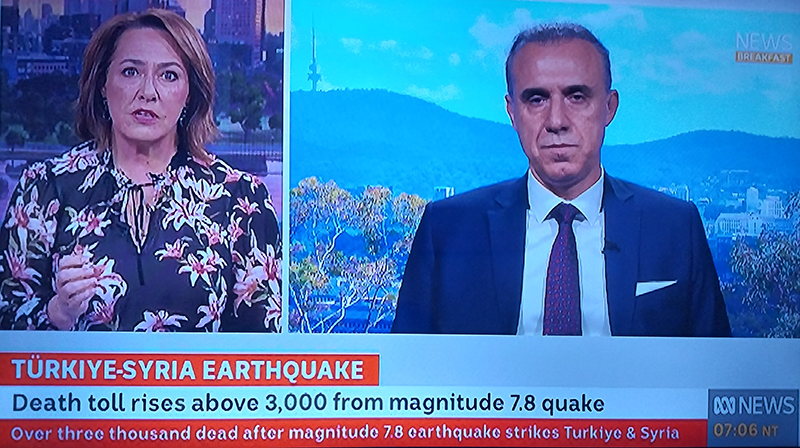

I was watching ABC News this morning — they were reporting on yesterday's earthquake in Turkey.
I noticed the announcer said: 'turk-e-ye' insted of 'Turkey'. Then I saw the word was spelt 'TÜRKIYE' in the screen caption.
'Where has this come from?' I ask. English doesn't use umlauts, and Turkey is spelt T-U-R-K-E-Y.
I Googled it and found that Türkiye is how Turkish people refer to their own country in the Turkish language.
I suddenly got an image of some boffin in 'The ABC Ministry for Political Correctness' ('MiniPC' in Newspeak), coming up with a brainwave: using English words to describe non-English speaking countries is linguistic colonialism, lets start calling countries by the name they call themselves.
So, here is the new regime:
| becomes | Türkiye | |
| becomes | Deutschland | |
| becomes | Italia | |
| becomes | Danmark | |
| becomes | Sverige | |
| becomes | Suomi |
I suggest the next (logical) step is to present any reports about foreign countries in their respective foreign languages.
This is an example of the ABC saying that they are more politically correct than any other network.
* * * * *
Date: 2nd November 2022
Source: Sky News: The Bolt Report. YouTube
Sky News: Andrew Bold on the Bruce Pascoe hoax
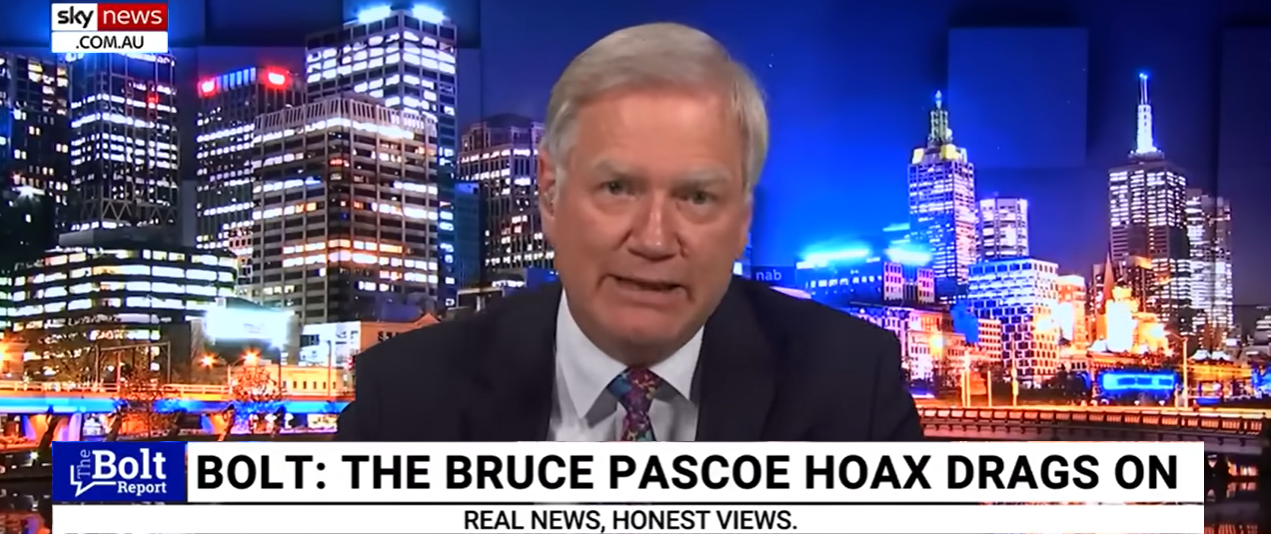
* * * * *
Date: 31st October 2022
Source: Guardian article
‘You people’: second-top cop accused of racialised language towards Queensland First Nations leaders
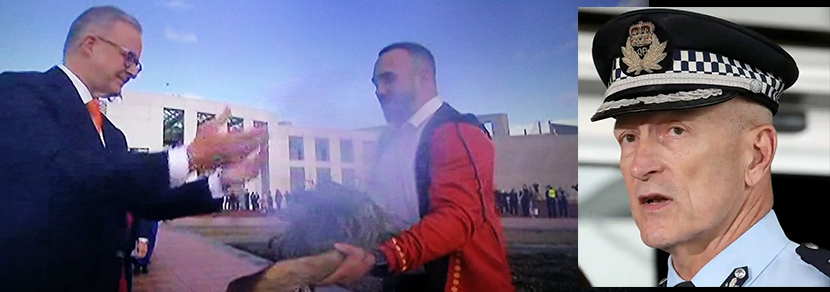
The Guardian article reports a meeting of the Queensland police service's First Nations Reference Group (all aboriginals), and Queensland police Deputy commissioner, Steve Gollschewski.
Three of the aboriginals present accused Mr Gollschewski of using 'racialised' language and deeply offending them when he pointed his finger at a senior elder and used the phrase 'you people'. (He went on to say that the commissioner — not the reference group — made decisions and that they should consider themselves lucky to have a seat at the table.)
One attendee, Dr Marlene Longbottom, who joined the meeting via video link from Thursday Island, said Gollschewski’s language made her feel 'othered'.
Think back to March 2014 ... there was outrage when the Attorney General tried to amend the Federal Race Discrimination Act to remove sections that make it illegal to 'hurt the feelings of others'. The key part being section 18C, which makes it unlawful for someone to publicly 'offend, insult, humiliate or intimidate' a person or a group of people. (ABC article)
Of course the problem with those terms is that 'taking offence' is a purely subjective reaction, and there is no test for its justification. It is just whether someone says so or not.
As a rule of thumb, I have always found that when a politician, (or anyone in the spotlight for that matter), says: 'I find that statement offensive!', it is a sure sign that they are trying to cover something up, evade responsibility, or generally get away with bad behaviour.
The Guardian article is an interesting example of the fawning nature of many news sources: they are competing against one another to be the most 'politically correct'. It is the same motivation and self-righteous feeling that the 18th century inquisitors had when they saw (alleged) 'heretics' burning at the stake.
An interesting indication of this is how the article employs capital letters. When I was at school we were taught, that apart from proper nouns, only the words 'God' and 'Government' were to be capitalised. However, this article, (which doesn't use the word 'aboriginal'), refers to 'First Nations people', 'Indigenous people' and 'Indigenous issues'.
I couldn't work it out: 'first nations' and 'indigenous' are adjectives — not even nouns. Why capitalise them? It is like writing 'a Red apple' or 'the Blue sky'.
I Googled the question and came up with a page on 'Inclusive Language' at the Monash University site. (link)
On that page they tell us to: 'Always capitalise 'Indigenous' and 'Aboriginal' when you're referring to Indigenous Australians, but not when you are referring generically to the original inhabitants of other continents.' Later they caution: 'Some Aboriginal people refer to themselves as 'blacks' or 'Aborigines', but others consider these terms offensive. If you are not an Indigenous Australian, avoid them.'
I could understand the use of capitals when referring to an aboriginal tribe or language, just as we capitalise English and Australian. But surely to capitalise generic terms and adjectives is not 'including' it is 'separating': marking as different and apart — 'othering'!
Note: This incident also illustrates a fundamental process in the political correctness arsenal: by altering a common practice to make it 'acceptable', you automatically label the unaltered practice as unaccepatable, without the need to provide a justification for that opinion. In terms of logical fallacies, it is 'an appeal to authority' (link): a university style guide, or an aboriginal advisory group says it is what to do, so it must be!
* * * * *

Date: 27th October 2022
Source: Intervier on ABC news with Brad Tucker, astrophysicist at the ANU in Canberra.
Discussing a new NASA project to study UNidentified Aerial Phenomena (UAPs).
We often hear of identified sightings in the skies — often referd to as unidentified flying objects. Are they flying objects? Visiting aliens? Simple phenomena of light?
Tucker commented that many visual sightings could not be explained by science. He adds:
‘It doesn't mean we don't know ... Its just we don't know yet.’
For me, this sums up the philosophy of the Age of Reason (17th century and continuing): the entirety of nature is discoverable via the efforts of empirical science, observation and the application of logic and reason.
So confident is Dr Tucker that he ignores one of the a priori axioms of empirical science: that of time. To not know at the present moment is actually to know in the light of future ('inevitable' he says) understanding.
* * * * *
Date: 21st October 2022
When Silence is a Statement
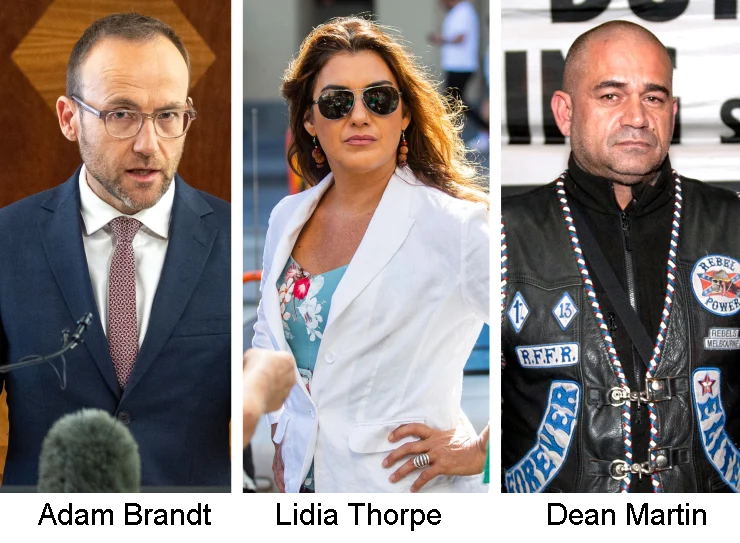
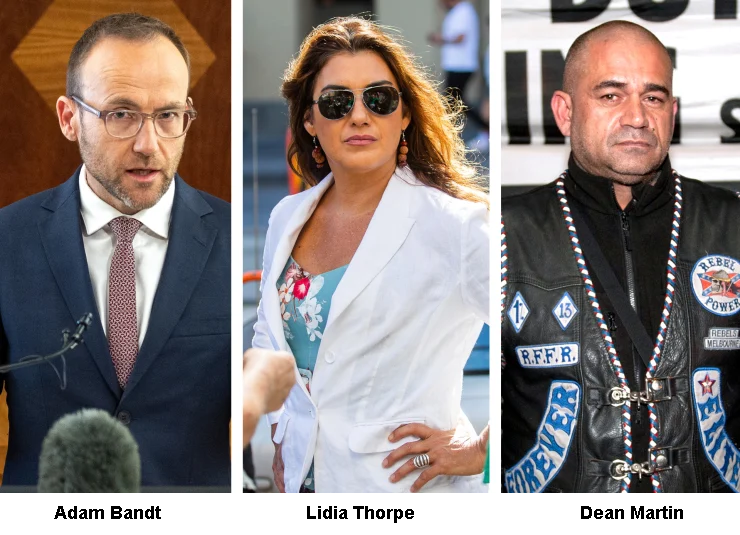
The agenda being followed by a news medium is often to be found in what is not published, rather than what is.
During the week, the Federal Greens party was rocked by the revelation that their deputy senate leader, prominent aboriginal rights advocate, Lidia Thorpe, has a continuing friendship, and previously was in a relationship with, an 'ex-' outlaw bikie boss, whilst sitting on a senate law enforcement committee, that was receiving confidential information about police efforts to counter illegal bikie-gang activity. (links Guardian; SMH.)
Prominent aboriginal elder, Marcia Langton, accused the Greens of 'displaying a peculiar form of racism in keeping Lidia Thorpe as the party's indigenous affairs spokesperson'. She added: 'They've chosen a person with apparently no common sense, an inability to understand the rules, and a willingness to break the rules'.
Surely this is news-worthy stuff in the forum of indigenous affairs. However, the 'National Indigenous Times' weekly news wrap, circulated by email on Friday (today), makes no mention of the issue. (Link.)
Is this silence, in fact, a statement of an agenda?
* * * * *
Date: 18th October 2022
Political Correctness
I was surprised to find several excellent videos on YouTube discussing political correctness.
YouTube GBPPR2: History of Political Correctness.
Political correctness's origins as a marxist plot to overturn capitalist economies
link
YouTube Step Back: Points out that the term was originally derogatory, meaning an adherence to outdated ideologies, not moving with innovation.
link
YouTube ideacity: Jordan Peterson on political correctness and postmodernism.
link
* * * * *
Date: 15th October 2022
Source: [Link]
In Australia each year, $36.6 billion worth of food is wasted. Half of this waste is produced by households.
Stop Food Waste Australia claims households’ food waste could be reduced annually by up to 10 per cent — or about 250,000 tonnes of food — with the adoption of best-practice date labelling.
A major cause of waste is confusion about the meanings of the food labels: use-by dates and best-before dates.
‘Use-by’ gives the date after which the food can’t be legally sold, and eating the food may pose a health or safety risk. However, this is a 'super-safe' standard set by food regulators. [Link]
Many foods will prove to be safe to eat after their use-by date, but you should use your common sense and smell the food before making your decision to eat it or not.
A general guide for some common foods is [Link]:
ground meat and poultry (1 to 2 days past the date)
beef (3 to 5 days past the date)
eggs (3 to 5 weeks past the date)
Foods with a ‘best-before’ date can be eaten for a while after that date, and sold after that date, provided the food is fit for human consumption. [Link]
* * * * *
Date: 15th October 2022
Anthony Albanese speaking at the opening of the NSW State Labor Conference:
‘We are restoring integrity to politics with a National Integrity Commission.’
‘[We are] restoring humanity, and dignity, and security to aged care.’
When you say that you are ‘restoring’ something, you are claiming, (but not stating), that that something existed previously.
I for one, have never thought (or felt), that federal politics in Australia ever enjoyed a generalised state of ‘integrity’. True some federal politicians at some times have displayed integrity, especially when championing their own vested interests, but my overwhelming opinion and feeling is that the system and most of the people in it have, over many years, lacked integrity.
What Albanese should have said was that he was 'introducing integrity to federal politics'.
Similarly, ‘restoring humanity, and dignity, and security to aged care’ presumes these qualities existed in the system at some time in the past. As someone who worked in the aged care industry for many years, whilst I saw most of the workers in the system striving to maintain humanity and dignity, the actions of successive federal governments was always working to undermine security, and press workers with unreasonable demands, such that they were constantly struggling to uphold humanity, and dignity.
In this case what Albanese should have said was that the government was going to stop lying and seeking to undermine the quality of aged care in the pursuit of economy.
It is a trick of false logic to argue from hidden premises: (see enthymeme)since they are not stated they are not open to challenge, and as a rhetorical device they invariably seek to persuade the audience to a complimentary view of the speaker.
* * * * *